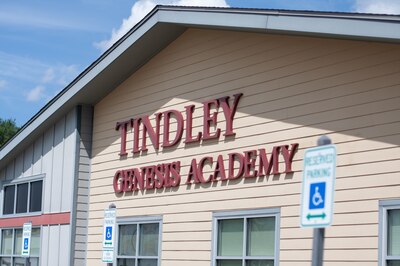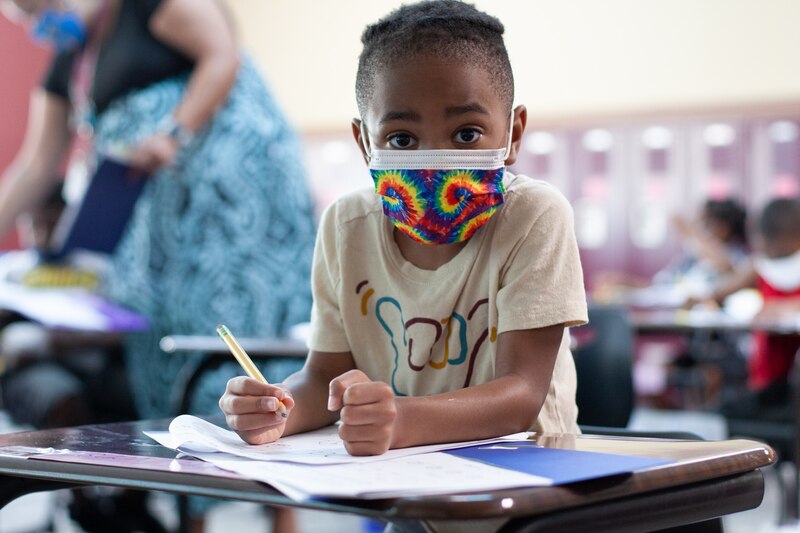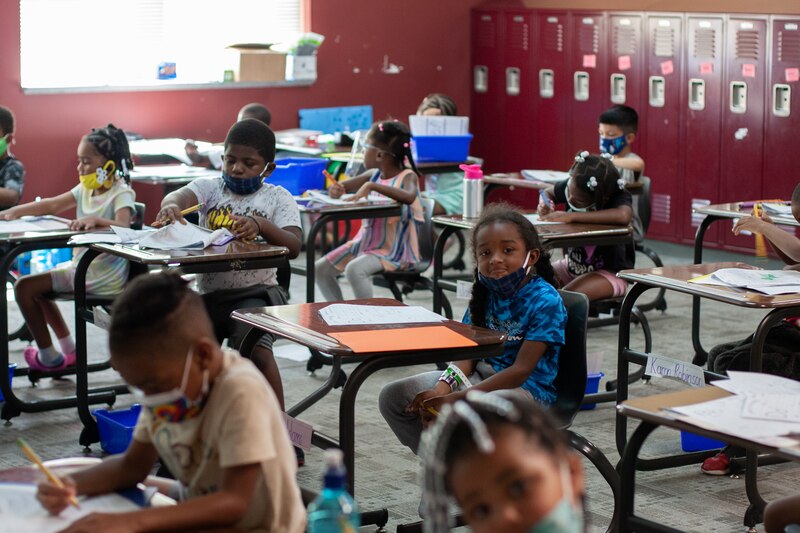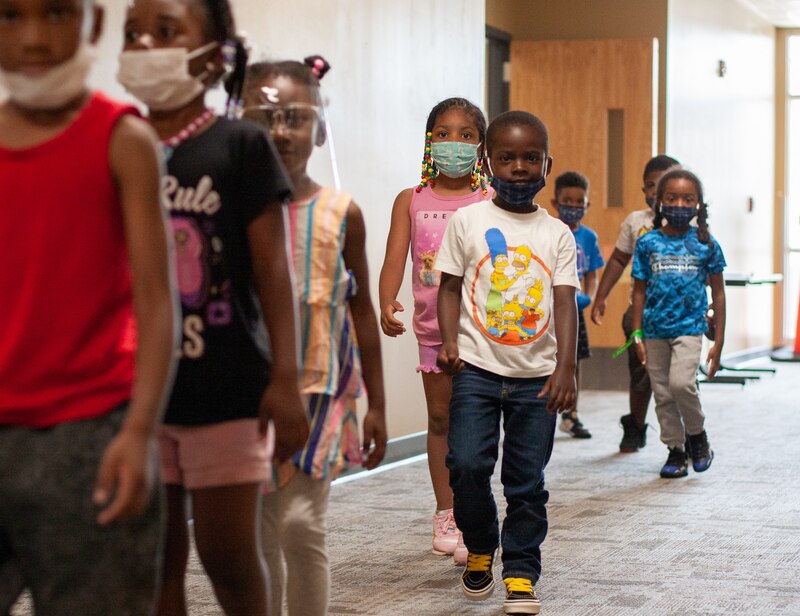Instead of spending their last summer before school playing, two dozen 4- and 5-year-olds in Indianapolis started class six weeks early this year to get a head start before kindergarten.
The students spent Tuesday morning learning about the letter D. They drew pictures of dogs, dragons, and Denny’s while teachers weaved through rows of tiny desks to help them properly hold their pencils and turn the pages of their workbooks.
“In the fall, they’re here all day, and sometimes that is a huge transition for kids,” Assistant Principal Ali Ennis said. “This is a nice kind of first step for them to do school for a half day.”

The students attend Kindergarten Kickstart, a five-week program meant to ease their transition to kindergarten. The program is open to students enrolled at Tindley Genesis Academy, an Indianapolis charter school that serves mostly Black and Latino students, many of whom are from low-income communities. Students stay from 9 a.m. to noon, easing into a school setting with short bursts of time in the classroom.
The program focuses on teaching kids day-to-day procedures, such as raising your hand before speaking, participating in call-and-response activities, and learning Tindley’s five rules. It also offers an opportunity for teachers to assess how much the students already know about letters and numbers through short tests that will help them craft lesson plans for the fall.
“I want the kids to feel empowered — when they come in the first day with the rest of their classmates, they should walk in a step ahead of everyone else,” Ennis said. “Kindergarten can be very overwhelming, and I want them to feel comfortable and happy about coming to school.”

Ennis said this year and last year, she noticed kindergarteners were less prepared to follow school procedures. They weren’t used to raising their hands before speaking, waiting their turn to use the bathroom, or staying in line when walking down the halls.
She said these skills are normally picked up at preschool or from socializing with other kids. But fewer students went to preschool during the pandemic, and those who did so online also lost opportunities to work on in-person behaviors.
“It was pretty evident that they hadn’t been practicing those skills, or hadn’t been given the opportunity to practice those skills,” Ennis said. “It made for kind of a rough start for those kindergarten babies.”
In addition to teaching the kids how to behave at school, teachers assign them jobs around the classroom, like passing out papers or sharpening pencils. Ennis said the students enjoy the responsibility that comes with these jobs, two of the most coveted positions being line leader and bathroom monitor — both of which allow them to be a little bossy.
The students also learn practical skills like how to tie their shoes and open a milk carton. This makes them more self-sufficient and lessens teachers’ workloads come fall.
Ennis said Tindley used to offer a two-week version of the jump start program, but expanded it to five weeks this summer, partly due to the effects of the pandemic.
“It’s something that Tindley students needed, especially after all the learning loss that occurred due to COVID, and the missed opportunities to socialize with other children and learn how to share,” she said.

While the kindergarteners had more trouble adapting to the structure of school due to the pandemic, their teacher, Tonya Gamble-Daoust, said she saw academic improvements compared with previous years. She thinks this could be because more parents were home with their kids, creating opportunities to read and learn together.
In past years, she estimated around 80% of her kindergarten students started school without basic knowledge of letters, numbers, or how to hold writing utensils or scissors.
“This year, I feel like I have more of a 60-40, where 60% of them really already know their letters, they can tell me even some of their sight words,” Gamble-Daoust said. “Somebody’s been working with them.”
Janila Thruston, a kindergarten student with elephant earrings and a shirt declaring “Girls Rule,” said her favorite part of the program is hanging out with her friends at recess. She also loves how the teachers take care of her, and, of course, all the snacks.

The program has already helped work out the kinks for some students. One kindergartener who had never been apart from his family for more than a few hours cried and wanted to leave on the first day. But after a couple days of staying the full time, he became a model student.
“That’s just proof of the need of the program,” said Abbi Achterberg, Tindley’s director of development.
Achterberg said since two teachers are working with one class, there’s more opportunity for one-on-one instruction, and she’s seen fast improvements among the students in their first week.
“They need a little bit of prompting — they’re still five — but I was pretty impressed to see how well they were doing given how early in the program it is,” Achterberg said.

